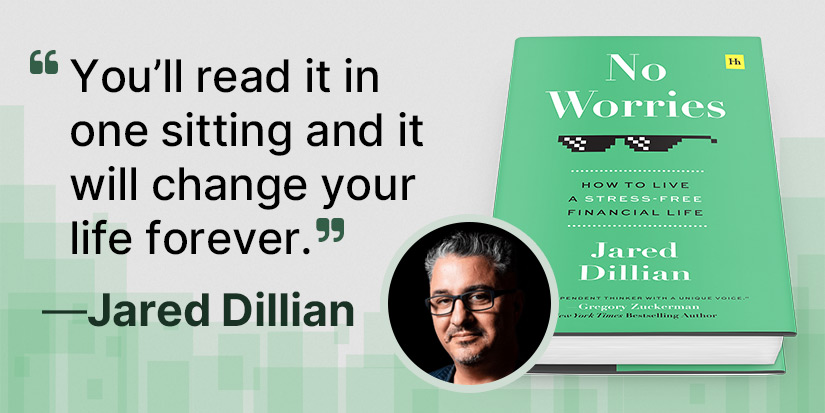
Till Death Do Us Part
-
 Jared Dillian
Jared Dillian
- |
- September 6, 2018
- |
- Comments
I met my wife at gifted and talented camp in the summer of 1989, when I randomly put my head in her lap and asked for a kiss.
Boy, did I get lucky.
I got lucky because we are both CFs and didn’t even know it. We didn’t fill out a questionnaire on money habits before we kissed each other.
Some people have the misfortune to be a CF and fall in love with someone who is a high roller.
Marriages go sideways for a bunch of reasons. Sex problems, substance abuse problems, but the worst problems of all are money problems.
Money Problems
If one person in a marriage is a CF and the other is a high roller, you might say they have different philosophies on money. But that isn’t accurate. The CF is psychologically hard-wired to be a CF and the high roller is hard-wired to be a high roller. It is highly unlikely that either of these people is going to change, outside of a significant emotional event.
If you’ve ever been married and spent any time trying to change your spouse, you know how that works out.
That’s why it’s important to have this conversation and to observe the other person’s behavior before you get married.
I was thinking the other day—when I graduated from business school in 2001, from the University of San Francisco, my wife, my mother and I went down to this magical place called Bix on Gold Street.
Gold Street was essentially in an alley right off Montgomery Street, downtown, and Bix had a speakeasy feel to it. I remember ordering my first ever martini. We walked out of there with a $72 tab, my biggest of all time. I was wearing one of my new Men’s Wearhouse suits and I felt like a high roller.
I was 27.
Now THAT is CF behavior. If my wife was someone who ran around dropping thousands of dollars in high-end department stores, the marriage just would not have worked. But she was even cheaper than I was. She only stopped clipping coupons a few years ago. She will still use them occasionally, if she comes across a good one.
Again, I cannot emphasize how fortunate we are.
I have seen marriages where one person spends and one person saves. Most of the arguments devolve into “you worry too much” or “you don’t worry enough.” Whenever the unhappy couple goes into a store, there is tension.
Dishonesty arises—one person will hide money from the other person in the marriage, creating secret accounts to keep it safe, and the other person will go to great lengths to attempt to conceal their spending. It becomes no longer about money, but about trust. Fights happen spontaneously, out of nowhere.
Like what you're reading?
Get this free newsletter in your inbox every Thursday! Read our privacy policy here.
People get divorced over money. Hell, people die over money—especially people with gambling problems.
This is serious business.
I don’t claim to have the answer for everyone, but I can tell you what worked for me.
Keep Your Money Separate
Before we moved in together, my wife and I agreed to keep our money separate—really separate. I have my money and she has her money.
If I want to spend it on something ridiculous, like a luxury backgammon board, there is not much she can say about it. It is my money.
If she wants to buy three dozen dresses, there is not much I can say about it. It is her money.
We split common expenses. In the old days, we split stuff 50/50. Then I started making a lot more money than her, so now we split stuff 80/20 or 90/10. We split the groceries 67/33, since I eat two-thirds of the food. If we go out to eat or do something fun, I pay.
As for the mortgage, she pays x and I pay 5x and we actually keep track of how much principal each of us has paid down, in a spreadsheet, as well as our percentage ownership of the house. For example, I currently own 81% of the house and she owns 19%. So if we sold, I would get 81% of the cash and she would get 19%.
If this all seems hard, maybe it is, but guess what:
We. Have. Never. Fought. About. Money.
I agree with a lot of what Dave Ramsey says, particularly about debt, but not when it comes to money in a marriage.
“Your spouse isn’t your roommate,” he says, “and this isn’t a joint business venture. It’s a marriage! You don’t run your household and your life separately. Your job is to love each other well, and that includes having shared financial goals—which is hard to do when you have separate accounts.”
I beg to differ. My wife and I just celebrated 21 years of marriage, and we have had plenty of shared financial goals: five houses, brokerage accounts, hedge funds, moving across the country, different jobs, you name it. Never has it been necessary to pool our money.
Even if it is an accounting fiction—so what? It keeps us happy, which is what it’s all about. If we combined our money, then we probably wouldn’t have the luxury backgammon board—and one of us would carry a resentment.
To Have and to Hold
I think a lot of people feel like they’re not truly committed to a relationship unless they commingle their funds. Like, they’re holding something back.
Like what you're reading?
Get this free newsletter in your inbox every Thursday! Read our privacy policy here.
As usual, it comes down to communication, and being able to argue effectively without being contemptuous, which is an entire book in itself.
I wish you luck. This stuff is hard. The important thing is to have a system that works. It doesn’t have to be precisely like my system, but it has to be an agreed-upon set of rules that creates the minimum amount of conflict. And if pooling your money works for you, then great—I’m glad you have a system.
I can tell you what not to do—don’t do what doesn’t work. If it’s not working, I suggest you stop that immediately.
From This Day Forward
We’ve reached Week 10 of The 10th Man personal finance series, which seems like a nice round point at which to take stock.
So far, I’ve talked about: ways to make more money, poorness as a chosen mentality, the optionality of cash, the importance of scalability, why you should save until it hurts, the philosophy and unproductivity of debt, CFs and high rollers and why it’s hard to sell centrism in personal finance, and of course, mortgages.
I said back in June that personal finance is actually more complicated than institutional finance, because there are so many decisions to be made. So we’ve covered a lot, but there is lots more to cover.
At this point, I want your input. What do you think we haven’t covered that needs some attention? What personal finance topic(s) do you want to see written up in The 10th Man?
Click below to share your thoughts:
We’re calling it a survey, but it’s just one question. And you can submit a one-word answer or take as long as you want.
This 10th Man personal finance series is going to continue for a while, so you should probably take this opportunity to weigh in.
subscribers@mauldineconomics.com
Tags
Suggested Reading...
|
|

 Jared Dillian
Jared Dillian


